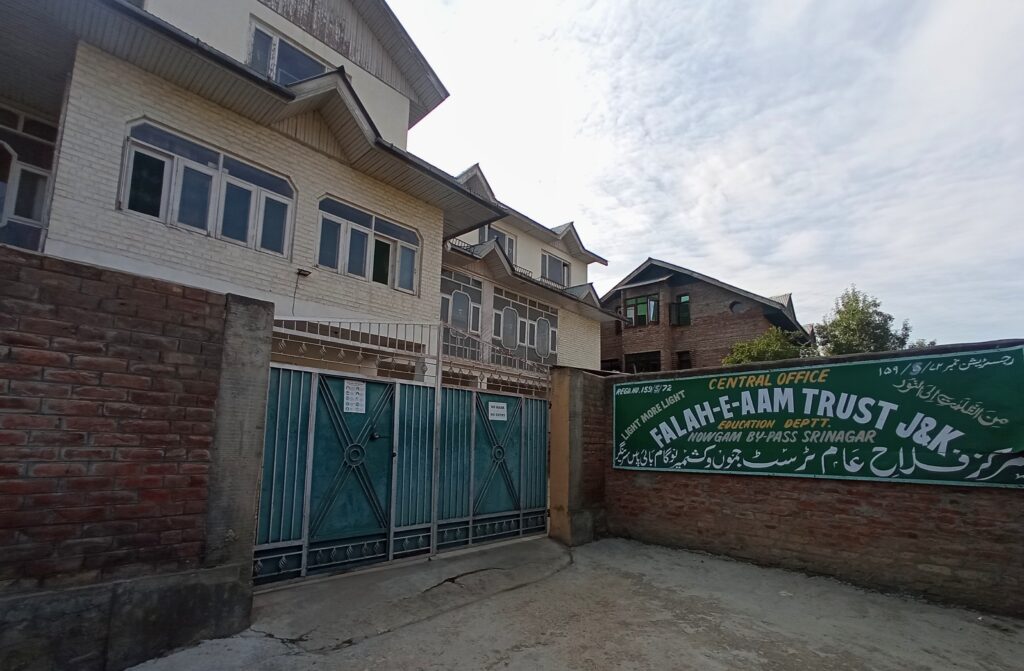The directive to shut down the schools came on 14 June 2022.
Mir Aiyaz
Zameer Ahmad is worried that the two-storey Islamia Model School in Diver, a faraway village in the picturesque Lolab valley of north Kashmir, stands desolate and locked since last month.
The fate of once-vibrant school, which provided education to rural children – many of them downtrodden – is now sealed as the state administration ordered a closure of nearly a dozen schools associated with Falah-e-Aam Trust (FAT). The trust was set-up by Jamaat-e-Islami in 1972.
The closure has left many teachers like Ahmad, who taught for 15 years at Diver’s Islamia Model School, in agony about their future and family.
Ahmad is 37 and has already crossed the age-limit criteria for a government job. The anguish is visible on his face and in his words.
“Most of us were earning a decent living by teaching in these community-welfare schools,” says Ahmad with a distressful body language. “But now, we have been rendered roofless. There’s no support in sight for my ousted tribe.”
In remote places like Lolab, where private sector and industrial progress never began, there are fewer career options and Ahmad, while teaching at the FAT-affiliated school, had been simultaneously attempting for a government job without success. The source of income now shut, age-limit has also ended other hopes for him.
“What options do I have now?” Ahmad, a humanities graduate who always wanted to be a teacher, asked. “The administration should have absorbed us in the government schools just like they adjusted students from FAT schools. But the thrust is clearly on punitive rather than welfare measures.”
THE BAN
The directive to shut down FAT schools came on 14 June 2022 when the administration ordered cessation of academic activities in these schools.
The order was issued by the Additional Secretary of School Education Department on the directions of the J&K government and it directed all the students studying in these banned institutions to admit themselves at government schools for the current session.
“No new admissions will be taken in these banned FAT institutions, and no further registration of these institutions will be done,” the order said.
The government said that FAT ran dozens of schools from primary to higher secondary level in Kashmir where hundreds of students are enrolled and Chief Education Officers were asked to seal these schools within 15 days in consultation with the district administration.
The Trust has had a troubled relationship with the administration in the past after it was founded by the Jamaat-e-Islami in 1972 when the organization was a part of the electoral politics. Soon, the Trust had several hundred schools set up across Kashmir valley.
The Trust was first banned in 1979. The trouble, however, mounted for the FAT in the aftermath of the eruption of militancy in Kashmir in 1990 amid Jamaat-e-Islami’s tacit endorsement of the Hizbul Mujahideen militant group even as the socio-political group later publicly disavowed this affiliation.
The latest closure order, however, drew immediate condemnation from politicians in the region with former Chief Minister and PDP president Mehbooba Mufti terming it as “another form of atrocity.”
“Move to ban FAT affiliated schools is another form of atrocity inflicted upon the people of J&K to sabotage their future,” she said. “After land ownership, resources and jobs, the last target is education. I am sure Kashmiris will overcome this and not let their children suffer.”
Sajjad Lone of Peoples Conference, who has had political differences with the Jamaat-e-Islami in the past, termed the ban on FAT schools as a regressive and discriminatory step. “Doesn’t a Kashmiri child have the right to study where he wants? The government of the day needs to understand societal sensitivities.”
Altaf Bukhari, the founder of Apni Party, while expressing his dismay, said, “It will not only dislodge the students but will also create joblessness.”
In the aftermath of the ban, an open letter was written by 200 former students of FAT schools who urged the government to revoke the order.
“We feel compelled to write to the Government of India and the Government of Jammu and Kashmir via media that Falah-e-Aam Trust (FAT) is a registered trust (Govt. Regd. vide no. 159/s; dated 31 July 1972) that runs as per the constitution duly submitted to the State. The objectives of the FAT as stated in Article 3 of its constitution include providing assistance to poor and needy without discrimination of religion, colour and creed; help in the education of the poor and needy students; open education institutions to educate all without any discrimination; and to assist other organizations in their humanitarian efforts.”
FAT, reiterated the alumni, is non-political in nature and is dedicated to education and service in Jammu and Kashmir, as reflects the Article 4 of the FAT constitution.
“After Sheikh Abdullah in 1971 banned any political party to run the schools, these schools were detached from the Jamaat-e-Islami organization so as to remain apolitical, charitable and social welfare organization under FAT,” it said.
“It is lethal for a government to ban institutions for a political agenda. Education must not be made casualty for political vendetta. Earlier, Governor Jagmohan Singh banned and closed down all the schools run by FAT in 1990 and it was the Honourable Supreme Court of India that rejected the ban as illegal and unfounded. Any ban on FAT schools, by the Government today, would not only be illegal but would have immense ramifications on the thoughts and minds of millions in the state. If the government is failing to deal with Kashmir politically, it must not ban schools in anger and desperation.”
Even as the ban remained in effect, the Jammu and Kashmir government clarified that Jamaat-e-Islamic affiliated schools, mosques and orphanages had been kept outside the purview of the ban on the organization which was imposed on it in 2019 for a period of five years.
MANY VERSIONS
The ban on the dozen schools linked to FAT came in the backdrop of a probe conducted by the State Investigation Agency (SIA) of Jammu and Kashmir Police which alleged gross illegalities, outright frauds and mass-scale encroachment of government lands by the trust.
The officials of SIA alleged that JeI mostly draws its sustenance from the vast network of FAT schools, seminaries, orphanages, pulpits of mosques and other charities and added that such institutions played a destructive role in large-scale unrest of 2008, 2010 and 2016.
“These Jamaat campuses were long on radar for their ideological bent,” a senior police officer told Kashmir Newsline. “The recent crackdown is part of a larger exercise to control a certain narrative fanning trouble in the region.”
However, a senior IAS officer, who like the police officer quoted above requested anonymity, said the action against the FAT schools has to do with the state lands.
“Most of them were operating illegally on the state land,” the officer said. “If notices can be served to former ministers for their illegal occupancy of the state properties, then everyone is supposed to conduct their affairs in a legal manner.”
However, locals of Lolab’s Diver aren’t buying the state land theory. “The school building is built on private land bought with public donations,” said an FAT teacher. “Even if it is a state land, why can’t it be used for education purposes if the same can be allocated for other activities?”
In its latest ban order, the administration has referred to the May 1990 ban order, followed by two court observations made in May 2005 and December 2021 to claim that the FAT has been running the schools illegally after the ban under the pretext of a High Court order.
However, majority of the schools ended their affiliations with the FAT after 1990, thus leaving only 18 schools still affiliated with it, said the FAT chairman Ghulam Mohammad Bhat. “It has been, time and again, made amply clear that the FAT is an independent, government-recognised and registered non-political entity having no affiliation with any political or religious organisation,” he said.
“Yet, these false allegations are leveled against the trust to defame it and thereby cause irreparable loss to its reputation as an excellent educational institution meant for the imparting of knowledge to all according to modern trends,” Bhat said.
At Diver, the teachers without campus and job believe the intent is to penalize a particular shade of opinion. “But they should at least spare teachers of the torment,” says Imtiyaz Bhat, a FAT teacher. “If we are the nation-builders, then we don’t deserve this deprivation.”
In his mid-forties, Mohammad Amin says even private schools are not entertaining their job applications now. “These schools have welcomed FAT students because they can charge hefty fees from them in the next session,” says the anguished FAT teacher. “But in all this madness, we are at the receiving end.”
Amin said the FAT teachers were greatly respected for their student-friendly works. Their thrust, he said, was to impart regular and moral education. “For students from financially weaker sections, such schools were light at the end of a tunnel,” Amin said. “Many orphans and poor students were either studying free of cost or at a nominal fee.”
Another FAT teacher said he was paying Rs 1100 monthly fees excluding transport fee for his child studying in LKG. “Whereas, a class LKG student in FAT run schools would pay nearly 300 rupees a month.”
In the face of this crisis, these teachers believe that blacklisting of the FAT schools is a violation of the Indian constitution, which under Article 30(1), gives all minorities right to establish and administer educational institutions of their choice.
“Earlier we were part of the knowledge campaign in Kashmir,” Amin said, “but now, we’ve become campaigners of our own deprived class.”
Tauseef Ahmad, an FAT teacher who also lost his job after the recent ban said the order defied logic. “The national anthem was a part of our morning assemblies. This ban is beyond comprehension,” he said.


